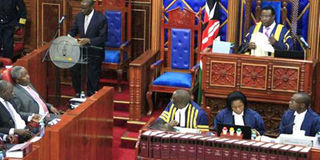For the Senate to deliver, we must understand its role better

Chief Justice Willy Mutunga addresses the Senate on June 15, 2016. Over and above its constitutional mandate, the Senate is expected to be the house of the wise. PHOTO | DIANA NGILA | NATION MEDIA GROUP
What you need to know:
- In fact counties and the Senate should endeavour to cultivate and maintain harmonious co-existence if devolution is to yield its full value to Kenyans.
- In ancient Rome, for instance, the senate served as the governing and advisory council’ that bequeathed an element of permanence to the constitution.
A cursory review by an average Kenyan will confirm that within the Legislature — and throughout the entire slew of post-2010 Constitution institutions — the Senate is, perhaps, the most ill-understood.
This may explain why, compared to the National Assembly, the Senate appears lackluster.
The good news is that this phenomenon is not unique to Kenya. The same is true of Canada, for instance.
The uninspiring sheen of the Senate should explain why some Kenyans in recent months have expressed so much dissatisfaction with it as to demand its dissolution.
Yet, there is absolutely nothing amiss about the station or roles of the Senate as constituted.
If any disconnect between its functions and outputs exists, then it is a result of lack of appreciation of the constitutional role assigned to senators.
Article 96 in Part One (Establishment and Role of Parliament) of Chapter Eight of the Constitution elucidates the object of its title – ‘Role of the Senate’.
The Senate was established to serve four constitutional roles.
First, to represent the counties and protect their interests and their governments.
Ideally, therefore, the relationship of the counties and that of the Senate ought not be adversarial.
In fact counties and the Senate should endeavour to cultivate and maintain harmonious co-existence if devolution is to yield its full value to Kenyans.
Two, as decreed in Articles 109 to 113 of the Constitution, the Senate is bound to participate “…in the law-making function of Parliament by considering, debating and approving Bills concerning counties…”
HOUSE OF THE WISE
The quality of laws focusing on the functionality and efficacy of both the National Assembly and county governments is, no doubt therefore, at the very core of the much-desired success envisaged to evolve from devolved governance.
Three, “The Senate determines the allocation of national revenue among counties, as provided in Article 217, and exercises oversight over national revenue allocated to the county governments”.
In other words, the Senate is expected to provide general oversight of and, loosely put, adjudicate over such concerns as equity and access in resource allocation nationally.
Fourth, “The Senate participates in the oversight of State officers by considering and determining any resolution to remove the President or Deputy President from office in accordance with Article 145”.
Again, the power of the Senate is acutely manifest in this provision that unambiguously confirms that the Senate is not and should never be relegated to the status of a shadowy appendage in Kenya’s legislative circles.
Over and above its constitutional mandate, the Senate is expected to be the house of the wise, a conclave of sages and the abode of judicious arbiters whose solemn duty is to adjudicate over what is desirable for the greater good of the citizenry.
Charged, as it is to oversee the nurturing and consolidation of devolved governance in Kenya, the Senate is, ideally, the council of mentors that ought to radiate the best of the soul of Kenya.
The foregoing is, actually, not without historical precedence.
In ancient Rome, for instance, the senate served as the governing and advisory council’ that bequeathed an element of permanence to the constitution.
At some point in the ancient Roman history, the senate, beyond its documented mandate, was the preferred arbiter between governance formations in situations that demanded civility and impartiality.
NATIONAL UNITY
In the contemporary world and in an uncanny and welcome coincidence, the Canadian senate serves three critical roles.
It is a ‘revising chamber’ where laws passed by Parliament are subjected to a thorough final check.
It is, secondly, also the icon of excellence in federal representation.
In Kenya, it would be an emblem of national unity where diversity would become a pillar of greater patriotism and nationhood.
Third, the Canadian Senate is the paragon of investigative excellence. No wonder the Canadian senate is proudly referred to as the “Chamber of Sober Second Thought”.
Clearly, there is another opportunity and reason to re-imagine and re-brand our Senate.
Kibiru is an entrepreneur and the Managing Director of Thika Greens Golf Estate





